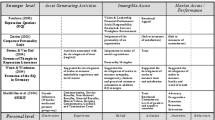Abstract
Management research on corporate reputation has grown exponentially in the last 20 years and has generated a proliferation of definitions and debates about what reputation is. These debates reflect often unacknowledged differences in the theoretical perspectives that have guided current research. This contribution provides a review of the different theoretical perspectives and their implications for the study and management of reputations, and highlights the recent trend towards develo** integrative, multi-dimensional theoretical and empirical approaches.
Access this chapter
Tax calculation will be finalised at checkout
Purchases are for personal use only
Similar content being viewed by others
References
Barnett, M.L., J.M. Jermier, and B.A. Lafferty. 2006. Corporate reputation: The definitional landscape. Corporate Reputation Review 9: 26–38.
Barney, J. 1991. Firm resources and sustained competitive advantage. Journal of Management 17: 99–120.
Basdeo, D.K., K.G. Smith, C.M. Grimm, V.P. Rindova, and P.J. Derfus. 2006. The impact of market actions on firm reputation. Strategic Management Journal 27: 1205–1219.
Cable, D.M., and M.E. Graham. 2000. The determinants of job seekers’ reputation perceptions. Journal of Organizational Behavior 21: 929–947.
Deephouse, D.L. 2000. Media reputation as a strategic resource: An integration of mass communication and resource-based theories. Journal of Management 26: 1091–1112.
Deutsch, Y., and T.W. Ross. 2003. You are known by the directors you keep: Reputable directors as a signaling mechanism for young firms. Management Science 49: 1003–1017.
Dichev, I. 1999. How good are business school rankings? Journal of Business 72: 201–213.
Dierickx, I., and K. Cool. 1989. Asset stock accumulation and sustainability of competitive advantage. Management Science 35: 1504–1511.
Elsbach, K.D., and R.M. Kramer. 1996. Members’ responses to organizational identity threats: encountering and countering the Business Week rankings. Administrative Science Quarterly 41: 442–476.
Fombrun, C.M. 1990. What’s in a name? Reputation building and corporate strategy. Academy of Management Journal 33: 233–258.
Fombrun, C.J. 1996. Reputation: Realizing value from the corporate image. Boston: Harvard Business School Press.
Gioia, D.A., and K.G. Corley. 2002. Being good versus looking good: Business school rankings and the Circean transformation from substance to image. Academy of Management Learning & Education 1: 107–120.
Hall, R. 1993. A framework linking intangible resources and capabilities to sustainable competitive advantage. Strategic Management Journal 14: 607–618.
Jensen, M., and A. Roy. 2008. Staging exchange partner choices: When do status and reputation matter? Academy of Management Journal 51: 495–516.
King, B.G., and D. Whetten. 2008. A social identity formulation of organizational reputation and legitimacy. Corporate Reputation Review 11: 192–207.
Kreps, D.M., and R. Wilson. 1982. Reputation and imperfect information. Journal of Economic Theory 27: 253–279.
Lange, D., P.M. Lee, and Y. Dai. 2010. Organizational reputation: A review. Journal of Management 37: 153–184.
Martins, L.L. 2005. A model of the effects of reputational rankings on organizational change. Organization Science 16: 701–720.
Milgrom, P., and J. Roberts. 1982. Predation, reputation, and entry deterrence. Journal of Economic Theory 27: 280–312.
Milgrom, P., and J. Roberts. 1986. Price and advertising signals of product quality. Journal of Political Economy 94: 796–821.
Pfarrer, M.D., T.G. Pollock, and V.P. Rindova. 2010. A tale of two assets: The effects of firm reputation and celebrity on earnings surprises and investors’ reactions. Academy of Management Journal 53: 1131–1152.
Podolny, J. 2005. Status signals: A sociological study of market competition. Princeton: Princeton University Press.
Pollock, T.G., V.P. Rindova, and P.G. Maggitti. 2008. Market watch: Information and availability cascades in the U.S. IPO market. Academy of Management Journal 51: 335–358.
Rao, H. 1994. The social construction of reputation: Certification contests, legitimation, and the survival of organizations in the American automobile industry 1895–1912. Strategic Management Journal 15: 29–44.
Rhee, M., and P.R. Haunschild. 2006. The liability of good reputation: A study of product recalls in the US automobile industry. Organization Science 17: 101–117.
Rhee, M., and M.E. Valdez. 2009. Contextual factors surrounding reputation damage with potential implications for repuation repair. Academy of Management Review 34: 146–168.
Rindova, V.P., and C.J. Fombrun. 1999. Constructing competitive advantage: The role of firm-constituent interactions. Strategic Management Journal 20: 691–710.
Rindova, V.P., and L.L. Martins. 2012. Show me the money: A multi-dimensional perspective on reputation as an intangible asset. In Oxford handbook of reputation management, ed. M. Barnett and T. Pollock. Oxford: Oxford University Press.
Rindova, V.P., I.O. Williamson, A.P. Petkova, and J.M. Sever. 2005. Being good or being known: An empirical examination of the dimensions, antecedents, and consequences of organizational reputation. Academy of Management Journal 48: 1033–1049.
Rindova, V.P., T.G. Pollock, and M.L.A. Hayward. 2006. Celebrity firms: The social construction of market popularity. Academy of Management Review 31: 50–71.
Rindova, V.P., A.P. Petkova, and S. Kotha. 2007. Standing out: How new firms in emerging markets build reputation. Strategic Organization 5: 31–70.
Roberts, P.W., and G.R. Dowling. 2002. Corporate reputation and sustained superior financial performance. Strategic Management Journal 23: 1077–1093.
Shamsie, J. 2003. The context of dominance: An industry-driven framework for exploiting reputation. Strategic Management Journal 24: 199–215.
Shapiro, C. 1983. Premiums for high quality products as returns to reputations. Quarterly Journal of Economics 98: 659–679.
Weigelt, K., and C. Camerer. 1988. Reputation and corporate strategy: A review of recent theory and applications. Strategic Management Journal 9: 443–454.
Yamey, B.S. 1972. Predatory price cutting: Notes and comments. Journal of Law and Economics 15: 129–147.
Author information
Authors and Affiliations
Corresponding author
Editor information
Editors and Affiliations
Copyright information
© 2018 Macmillan Publishers Ltd., part of Springer Nature
About this entry
Cite this entry
Rindova, V.P. (2018). Reputation. In: Augier, M., Teece, D.J. (eds) The Palgrave Encyclopedia of Strategic Management. Palgrave Macmillan, London. https://doi.org/10.1057/978-1-137-00772-8_564
Download citation
DOI: https://doi.org/10.1057/978-1-137-00772-8_564
Published:
Publisher Name: Palgrave Macmillan, London
Print ISBN: 978-0-230-53721-7
Online ISBN: 978-1-137-00772-8
eBook Packages: Business and ManagementReference Module Humanities and Social SciencesReference Module Business, Economics and Social Sciences




